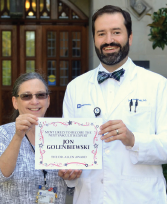Nancy Bates Allen, MD, now professor emeritus, Duke University Medical School, Division of Rheumatology and Immunology, Durham, N.C., created a legacy of clinical care, clinical research, advocacy for women and collegial respect during her 42-year career at Duke.
David S. Caldwell, MD, FACP, FACR, associate professor of medicine, Duke University School of Medicine, says, “[I’m] entering my 47th year at Duke [and] reflecting on accomplishments. Easily the one that stands out the most was convincing a young house officer, Nancy Allen, to pursue a career in rheumatology. Thankfully, she agreed.”
Career Foci: Rheumatology, then Vasculitis

Nancy Bates Allen, MD
Dr. Allen showed an early propensity for science and medicine, working at the McGuire VA Hospital in Richmond, Va., with David Propert, MD, on a summer fellowship right after high school. During subsequent summers, she worked in labs at the Medical College of Virginia, Richmond; the Karolinska Institute, Sweden; and Massachusetts General Hospital, Boston, while pursuing her Bachelor of Science in biology at Wellesley College, Massachusetts.
She attended the Medical College of Virginia (1974–75) and transferred to Tufts University School of Medicine, Boston, in 1975 to be with her husband, Barry. She and her husband moved to Duke University after she attained her MD—he to pursue graduate work in physiology, and she to begin an internship in internal medicine.
In fall 1978, she agreed to swap a pulmonary rotation with a colleague’s rheumatology rotation, and, in her words, “The rest is history!”

Dr. Allen with David S. Caldwell, MD, in the rheumatology clinic this year.
It was while she was doing rounds with Barton Haynes, MD, during her rheumatology fellowship that she became interested in the vasculitides. Her inspiration to further investigate granulomatosis with polyangiitis (Wegener’s) was drawn in part from attending a 1986 colloquy on vasculitides of the respiratory tract, convened by Dick DeRemee at the Mayo Clinic, Rochester, Minn. Dr. Allen notes, “This foundational meeting brought together about 100 enthusiastic researchers and clinicians (representing pulmonology, rheumatology, nephrology, ENT, thoracic surgery, ophthalmology, pediatrics, pathology, radiology and more) from the U.S. and Europe to share what we knew about GPA and to map out future directions.”
From a personal standpoint, the meeting was particularly memorable because of the effort she expended to get there: “My flight to the meeting was cancelled and rebooked through St. Louis to Minneapolis, where the airlines put me up overnight. Since I was pregnant with twins and sick as a dog, the next morning flight on a 10-seater to Rochester was awful. I arrived in time to give my first of two talks. In spite of this, the meeting was the absolute best of my career, and spurred me on to contribute as much as I could over the next three-plus decades.”

Dr. Allen’s twins, Peter and D. Allen, celebrated their 25th birthday with her while Dr. Allen was attending the 2011 ACR/ARP Annual Meeting in Chicago.
She returned to Duke and helped set up the assay for ANCA in the FANA (fluorescent anti-nuclear antibody) laboratory, where she was then the director.
For many years, notes Bill St.Clair, MD, the W. Lester Brooks Jr. Distinguished Professor of Medicine and chief of the Duke Division of Rheumatology and Immunology, “Dr. Allen has been the local expert on vasculitis.” She and Dr. St.Clair participated in the first multicenter, randomized clinical trials of ANCA-associated vasculitis conducted in the U.S.: WGET and RAVE.1,2
“I didn’t actually think of myself as the vasculitis expert, but I was good at doing clinical trials,” Dr. St.Clair recalls. “So that’s how we blended our talents. It was really a great relationship.”
Dr. Allen notes, “Although WGET was a negative trial in the sense that it did not add to conventional therapies for mild or severe [granulomatosis with polyangiitis], we learned more about associations with thyroid disease, venous thromboembolic disease, cancer risks and other clinical manifestations.”
And, of course, results from the RAVE trial led to the transformation of the management of ANCA vasculitis.
Champion for Diversity

Dr. Allen and Barton F. Haynes, MD, with Anthony Fauci, MD (center) in 1995 when Dr. Fauci received an honorary Doctor of Science degree from Duke University Medical School.
Dr. Allen leaves a division appreciably more diverse than the one she joined as an associate in medicine in 1982, an appointment that overlapped with her fellowship there in rheumatology. (She also did her internship and residency at Duke.) Her colleagues attribute her efforts, both within the division and at the institutional level, as pivotal in advancing opportunities for women.
Peter Lange, PhD, professor emeritus of political science and provost emeritus of Duke University (1999–2014), appointed Dr. Allen as special assistant to the provost for faculty diversity and development in 2005. During her one-year tenure in that post, they met the goals set to double the number of African American faculty members.
Dr. Lange appointed her vice provost in 2006, and she served in that position until 2015. Dr. Allen “displayed a deep commitment to women’s issues and minority issues,” says Dr. Lange. “She combines incredible empathy with resolve. You could rely on her to be thorough and committed, to press her case when necessary and to work well with others.”
“I always saw her as a consistent and focused leader, someone I felt honored to partner with,” says Benjamin D. Reese Jr., PsyD, former vice president of institutional equity and chief diversity officer, and now adjunct professor of psychiatry and behavioral science at Duke. “Many people will focus on gender and racial equity when there is a project to do or some kind of protest. What stood out to me about Nancy was the consistency of her focus on issues of equity, particularly related to gender. In all our partnerships I felt I had someone who could pay attention to all of the details and tracking and monitoring that are so important to change.”
Effecting Policy Change

Dr. Allen presented Duke fellow Jon Golenbiewski, DO, now on faculty at Wake Forest Baptist, Winston-Salem, N.C., with the Dr. Allen Award for the Most Likely to Become the Next Vasculitis Expert in 2019.
Dr. Allen explains that part of her motivation to participate in administrative-level hiring and tenure policy changes began as self-defense. She recalls that James Wyngaarden, MD, the chair of the department in 1982, had remarked that her pre-tenure track appointment as associate in medicine would be temporary because she was not the kind of person the institution needed long term. “The meaning [of his remark] to me was: 1) I was a woman, and there were only four or five women faculty then out of 125 in the Department of Medicine; and 2) I was not planning to do bench research.”
Dr. Allen determined to make the best of the situation and entered the tenure track in 1984. Two years later, she and her husband had twins; she reached associate professor with tenure status in 1992, when her twins were 5 years old, and achieved full professor in 1999.
Dr. Allen was also determined “to make Duke a better place” for women coming after her. “There were so few women [on faculty], so one of the scourges of being a minority was I got asked to join and chair committees.”
She willingly agreed, and despite a full clinical and teaching load, she became an active member of many academic and faculty governance committees. She served on the Academic Council (Duke University’s faculty senate) Executive Committee during the first two years of Nannerl O. Keohane’s presidency of Duke; and she chaired the Academic Council from 2002–05—the first woman from clinical sciences and only the second woman in the history of the Academic Council to do so.
Passing the Baton
Dr. Allen became the first chair of the Women’s Committee in the Department of Medicine in the mid-1980s when Joseph Greenfield, MD, asked her to advise him about salary equity, harassment, safety, appointments, promotion and tenure, along with other issues, for women. (Of note, his daughter was just starting her own residency.) Dr. Allen served as chair of that committee, as well as the Rheumatology Fellowship Program Director, for 12 years.
Lisa Criscione-Schreiber, MD, associate professor medicine and co-founder, with Megan Clowse, MD, of the Duke Lupus Clinic, has served as the fellowship program director for the past 12 years and was recently appointed vice chair for education in the Department of Medicine. “We’re very fortunate at Duke that we have a lot of female leadership,” says Dr. Criscione-Schreiber. “That is due in no small part to Nancy’s work in laying the groundwork. She is incredibly supportive of women’s careers and pushed to make sure everyone understands the challenges that women face in academic medicine.”
Dr. Allen is proud to have garnered numerous awards throughout her career, including the Eugene A. Stead Jr. Award for Excellence in Teaching from the Department of Medicine house staff in 1986, Distinguished Faculty Award from the Duke Medical Alumni Association in 1996, the Leonard Palumbo Jr. MD Faculty Achievement Award in 2004 and the Department of Medicine’s Achievement in Rheumatology and Immunology Education Award in 2013, 2019 and 2020.
She has cared for several thousand rheumatology patients, some of them for several decades, at Duke and at outreach clinics in underserved areas of Roxboro and Oxford, N.C.—another testament to Dr. Allen’s commitment to her values about equity.
It’s been difficult, she says, to say goodbye to patients via telehealth due to the pandemic. “Patients are my friends as well. I’ve told some of them that, at some point, when it’s safe for us to go out and meet for lunch, to send me a message. I probably have a little bit of the old country doctor in my makeup!”
Dr. Allen’s time will be filled with a raft of activities, including sorting through files and memorabilia from the past 42 years while writing her memoir. She’s an avid photographer, a pursuit she enjoyed with her late father Paul Bates—and in fact, has taken many of the division’s official portraits over the years.
“I look forward,” she says, “to retiring with emeritus status after such a long, varied and rewarding career.”
Gretchen Henkel is a health and medical journalist based in California.
References
- Wegener’s Granulomatosis Etanercept Trial (WGET) Research Group. Etanercept plus standard therapy for Wegener’s granulomatosis. N Engl J Med. 2005 Jan 27;352:351–361.
- Stone JH, Merkel PA, Spiera R, et al. Rituximab versus cyclophosphamide for ANCA-associated vasculitis. N Engl J Med. 2010 Jul 15;363(3):221–232.


